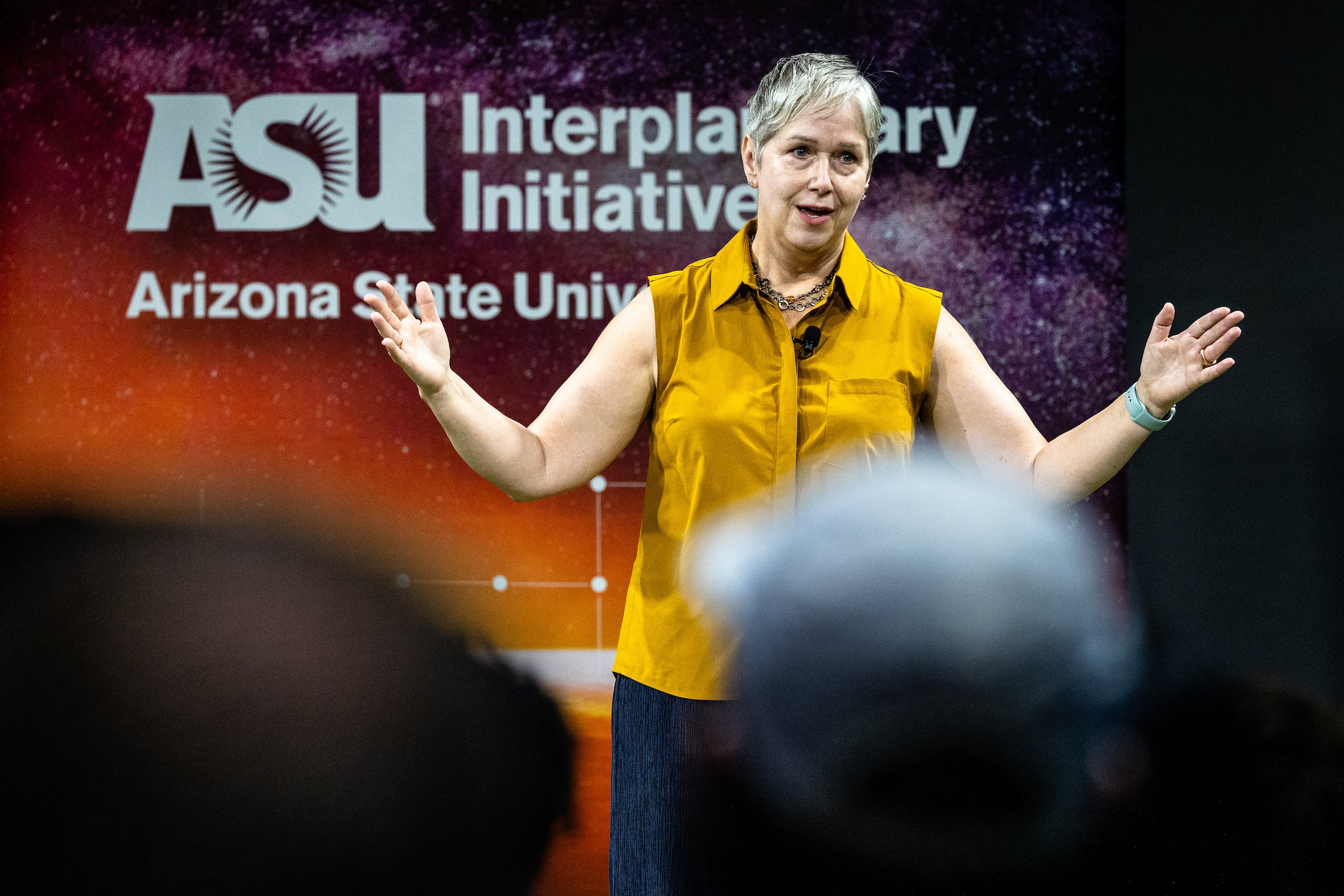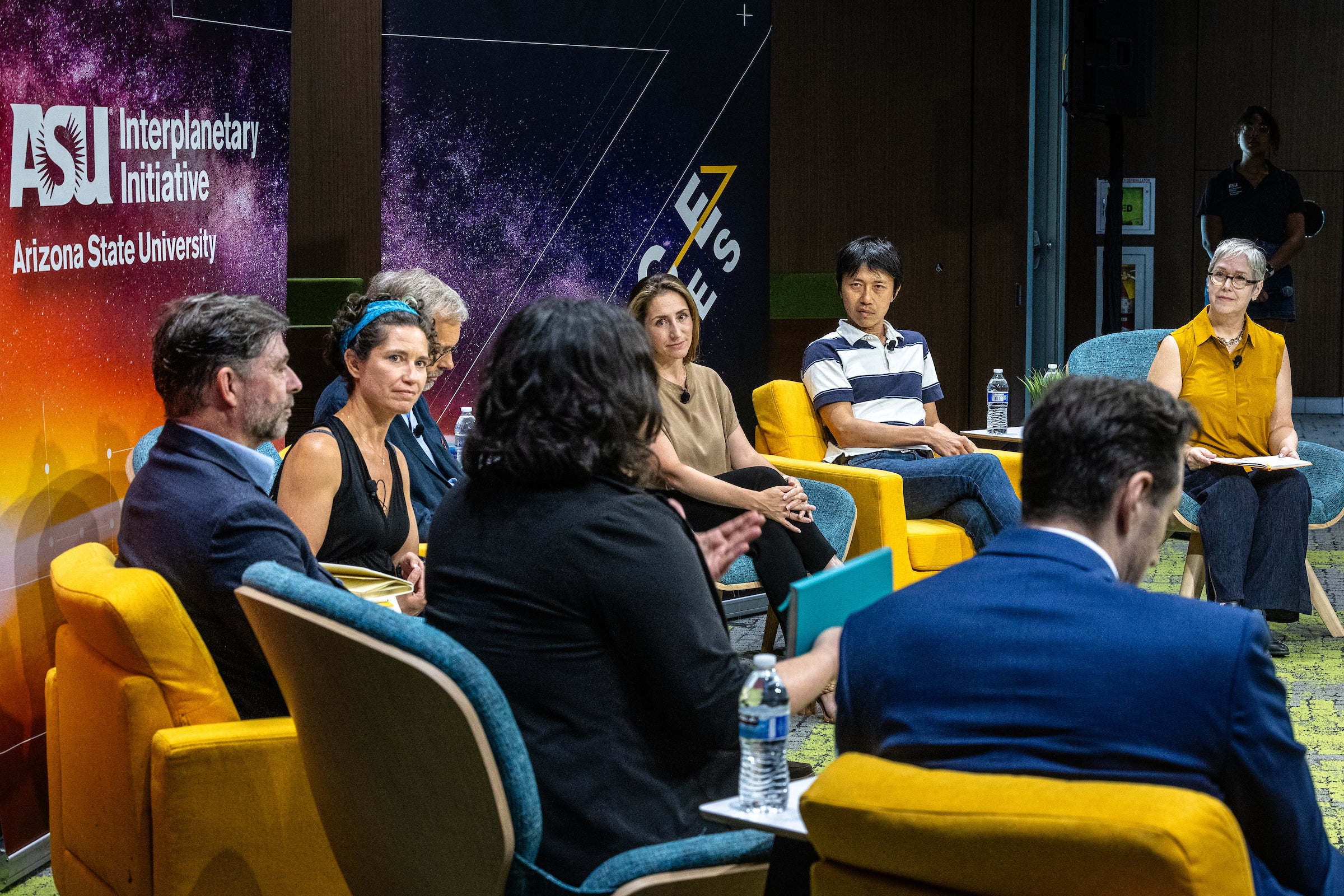Do human beings deserve another planet? How can lessons from the past help inform space futures? What have we learned on Earth and what can we learn on Mars?
Those were just a few of the questions contemplated at the Space Futures Live presentation Thursday afternoon inside the Rob and Melani Walton Center for Planetary Health.
The event, hosted by the ASU Interplanetary Initiative, featured seven speakers, a panel discussion moderated by Lindy Elkins-Tanton, vice president of the Interplanetary Initiative and an ASU Regents Professor, and questions from the audience.
The overarching theme: How can a positive space future be secured?
“We need to think about our long-term values as a space-faring civilization,” said Christopher Johnson, space law advisor at the Secure World Foundation and a space law educator at Georgetown University. “I would put at the top of those values preserving peace, preserving respect for the rule of law and sustainability for future generations. And there are other notions of respecting commerce, respecting scientific investigations and respecting human life.
“I know that we need to have difficult, challenging but absolutely essential discussions about what values we’ll have when we go to space.”
In the panel discussion, Elkins-Tanton asked a single question: Do humans deserve another planet?
Lindy Elkins-Tanton, vice president of ASU Interplanetary Initiative, speaks at Space Futures Live, an innovative discussion featuring seven experts focused on shaping a positive space future, on Thursday, Aug. 24, at the Walton Center for Planetary Health. Photo by Charlie Leight/ASU News
Six of the panelists said yes, with conditions. Mary-Jane Rubenstein, a professor of religion and science in society at Wesleyan University, said no.
“My gut feeling is that we don’t; that we’ve been terrible stewards of this particular planet,” Rubenstein said. “And as much as I love, respect, admire and am ravished into admiration by science, science has been just as complicit in the destruction of the planet as anything else.
“My feelings could be wrong, though. I could sort of convince myself into the opposite.”
Phil Metzger, a planetary scientist and associate scientist at the University of Central Florida, said for pragmatic reasons — the environment, overpopulation, etc. — “it would help our globe if we extended beyond planet Earth.”
During their presentations, each of the speakers posed their own question in addressing the need for a positive space future.
Christopher Johnson: What space law innovations enable interplanetary humanity?
Although the 1967 Outer Space Treaty and the 1979 Moon Agreement govern the activities of nations in outer space, Johnson said new laws are needed to guarantee a positive space future.
“When we are in a place, which is hundreds of thousands of kilometers from the nearest courthouse, a place with different gravity and environment and subject to cosmic background radiation and microbes, why would we be using terrestrial concepts and terrestrial issues and norms?” Johnson said. “So we will have to develop new ideas which assist and enable, as I say, interplanetary humanity to do that and not (repeat) all the miseries and horrors of the past.
“We need new rules which don’t create tension, which don’t create rivalry, which don’t seem to foster the potential for conflict amongst each other.”
Shannon Curry, principal investigator for the NASA Mars Maven mission: What have we learned at Earth and what can we learn at Mars?
“I picked Mars because Mars is our next natural target when we think about human exploration,” Curry said.
Curry said questions of sustainability and the governance of a new planet are vital to consider.
“What would we do if we did find life?” she said. “And how would a human presence affect an ecosystem? These are core questions that we need to think about, and especially in a timely manner, maybe the next 40 years, maybe sooner.
“Is there a guiding principle? For me, that’s science. That sounds simple, perhaps a little pie in the sky, but I’m being serious. I think its science. No one nation or entity can or should lay claim to another planet. Let science be a unifier in helping us create laws and guidelines and how we all interact going forward in space.”
Phil Metzger: How can we ensure that space resources benefit all people on Earth, not just a privileged few?
“The question presupposes that space resources will produce a gigantic benefit, and I’m convinced that they will,” Metzger said. “I’m convinced that this will actually lead to an economic revolution.”
The problem, according to Metzger: Only the wealthy will be in a position to benefit from those resources.
“You need spaceships and rockets,” Metzger said. “I’ve worked in this career my entire life and I still don’t own a functional spacesuit. Does anybody in this room own a functional spacesuit? If you don’t, you can’t go there.
“We’ve been very successful as a species. But in the future, when we try to extend civilization beyond planet Earth, we run into this problem that the technology necessary to do that is so expensive that it prohibits most of us from taking part.
“So that means we need to be asking the question: How can we create on-ramps for participation by all humanity so that we all go together into space and we’re all the owners and beneficiaries of this?”
Experts came together for Space Futures Live at ASU to offer their views on topics ranging from advanced robotics for water and mineral exploration to the ethics and philosophy of inhabiting terrestrial localities. Photo by Charlie Leight/ASU News
Hiro Ono, group leader of the Robotic Surface Mobility Group at the Jet Propulsion Laboratory: How far can we (humans and robots) go?
Ono showed the audience video of JPL’s newest robot, called Exobiology Extant Life Surveyor. Or EELS, because it looks like an eel.
EELS, which is a snake-like, self-propelled robot, uses first-of-a-kind rotating propulsion units that can adapt to various terrains, including the ocean surface, in searching for life.
“That will be a discovery that is forever remembered by our remote descendants,” Ono said.
But, Ono cautioned, patience is needed before colonizing other planets.
“Sometimes I think humans get a little bit arrogant by our own causes,” he said. “The reality is, we cannot even control the climate on our own planet. So let’s remember we are going to other worlds not to occupy or colonize, but to learn. We go not to amplify our arrogance, but to become wiser. Let’s first make sure that this civilization will prosper.
Lisa Ruth Rand, assistant professor of history, California Institute of Technology: How can lessons from the past help inform space futures?
According to the European Space Agency, there are 36,000 objects of space debris larger than 10 centimeters, 1 million objects between one and 10 centimeters, and 130 million objects between one millimeter to one centimeter.
Rand used those numbers as an object lesson about how society needs to learn from its past mistakes before even thinking about colonizing space.
“Orbital debris was a relatively new problem caused by ignorance at best and negligence at worst on behalf of the United States and the Soviet Union space programs during the 1960s and 1970s,” Rand said. “I quickly learned there was much, much more to this story. Turns out not only had the space industries of the Cold War been aware of the potential dangers of orbital debris, communities around the world understood that outer space was a place that could be polluted. And they understood that from the very start of the space age.”
Rand said it’s important to think of a single word: We.
“We will go to the moon again. We will build habitats on Mars. We will take on the space debris crisis. 'We' signifies a unified homogenous human experience. It also implies a unanimous approach to inhabiting other worlds."
Jacques Arnold, project director for ethical issues at the National Center for Space Studies: Why would a nation state encourage the emergence of an interplanetary humanity?
“The prospect of extraterrestrial settlement requires or stimulates new technologies, industrial development; it can open up new economies, diversify the supply of raw materials and energy, enhance national prestige and support the policy of influence,” Arnold said. “But you also know that these reasons are similar to those which in the past and still today have led nations to conquest and colonize foreign territories.”
Given that, Arnold said, is society ready to support interplanetary humankind?
“Is it enough to reach another planet such as Mars and deposit a robot?” he said. “Or is it necessary to establish a permanent, human settlement? It’s a fact that we have to establish relations between Earth and other cellular bodies. But what kind of relations? Assistance? Domination? Independence? Autonomy? Reciprocity?
"All good questions we can’t forget.”
Top photo: Lindy Elkins-Tanton, vice president of the Interplanetary Initiative and principal investigator of the NASA Psyche mission (far right onstage) moderates a panel during Space Futures Live, an innovative discussion that featured seven experts focused on shaping a positive space future, on Thursday, Aug. 24, at the Walton Center for Planetary Health. Photo by Charlie Leight/ASU News
More Science and technology

Stuck at the airport and we love it #not
Airports don’t bring out the best in people.Ten years ago, Ashwin Rajadesingan was traveling and had that thought. Today, he is an assistant professor at the University of Texas at Austin, but back…

ASU in position to accelerate collaboration between space, semiconductor industries
More than 200 academic, business and government leaders in the space industry converged in Tempe March 19–20 for the third annual Arizona Space Summit, a statewide effort designed to elevate…

A spectacular celestial event: Nova explosion in Northern Crown constellation expected within 18 months
Within the next year to 18 months, stargazers around the world will witness a dazzling celestial event as a “new” star appears in the constellation Corona Borealis, also known as the Northern Crown.…




